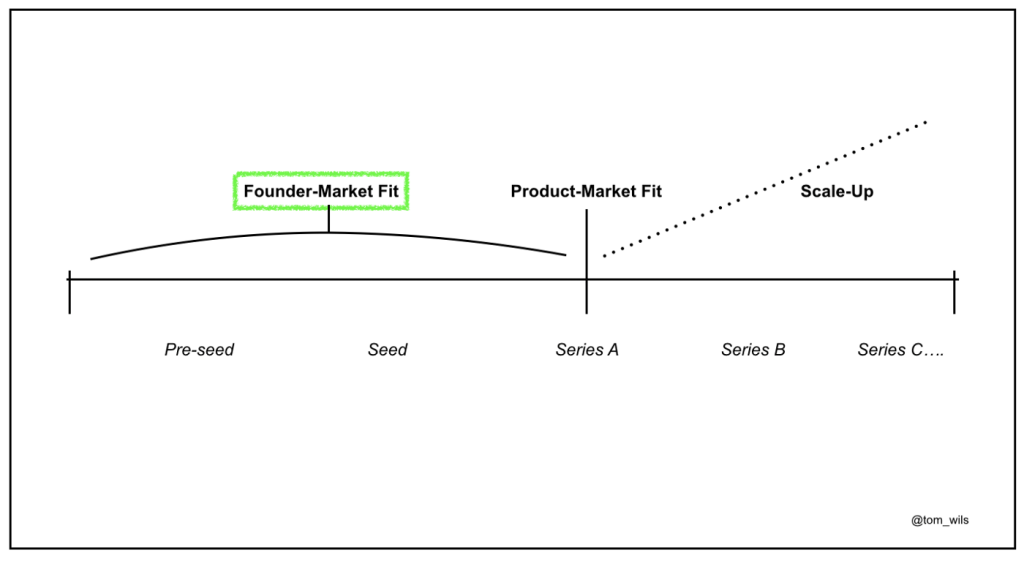
As a pre-seed and seed stage investor, we very rarely have the luxury of investing where there are clear signs of product-market fit and hence getting a sense of if founder-market fit is present is of crucial importance and something we spend a lot of time focused on.
3 ways that founder-market fit can manifest:
- Domain expertis
- Mission-driven mindset
- Technical skills
To really nail it, there’s usually some form of a combination of the above present across a founding team and the importance of each can be quite specific to the startup being built. The question that this framework is getting at boils down to:
Why is this THE team to do it?
Domain expertise
Startups are incredibly hard, I’m constantly in awe of the founders I have the privilege to engage with across our portfolio and beyond. To build a successful startup there needs to be as many factors working in its favour as possible and one that can provide that edge is domain expertise. Sometimes domain expertise can be confused with domain interest. For example, just because someone might enjoy travelling (domain interest) does not necessarily mean that they have the founder-market fit necessary to build a billion-dollar travel startup. On the other hand, if the founding team have worked at booking, Skyscanner, Mr and Mrs Smith, Secret Escapes etc. and know the intricacies of how this market operates and the stakeholders involved then this would likely tick the box. Domain expertise likely carries more weight when assessing founder- market fit for certain sectors over others. Very broadly, I think this element of founder-market fit is likely most relevant in the B2B space where it’s even harder to really understand the specifics of a market without having been on the front-line immersed in the sector. As a rule of thumb, the more specialised the market the more such experience is crucial.
Mission-driven mindset
Founders who have this, in my experience, will push harder and not take no for an answer and therefore put themselves in an even stronger position to succeed. How it manifests itself might be a personal connection from the founding team to the problem that the startup is solving. We’ve seen a number of examples of this in the health space where a founder may have experienced first hand or via a family member the problem they are solving for. This mission-driven mindset can be incredibly powerful in creating a connection to the problem and a compelling narrative around why they are the perfect person and/or team to be building a product in such a space. Having this across the founding team can be influential in inspiring others to join the journey the startup is on, whether that be investors or early employees, and can be formative in creating a winning culture.
Technical skills
When considering technical skills generally we are thinking about across a founding team rather than specific to any one individual. The impact this can have on the degree of founder-market fit is dependant on the nature of the startup being built. Naturally, for a deeply technical company (i.e. artificial intelligence or biotech etc.) having the requisite skill set in the founding team is of the utmost importance. Equally, for less deeply technical products less emphasis can be placed on this element. However, for less technical products or applications, as technical skills may be less of a factor in assessing founder-market fit there likely needs to be excellence present across the other areas considered above.
An additional area, that is something to bear in mind when considering the degree of founder-market fit present for a VC backable company, is the ability of the founding team to raise capital. Of course, there are many examples of perfect founder-market fit teams which will not need to go down the VC funding route. However, for those that do, having someone across the founding team who poses a skill for fundraising will put the startup in a strong position at the founder-market fit stage before the company has achieved product-market fit and can rely more heavily on traction and metrics for fundraising.
Overall, to give the above factors the chance to take effect and propel a startup to what it’s capable of a herculean amount of hard work, resilience and (of course) luck is also needed. Throw all that together and there’s a great shot of getting to that holy grail of product-market fit!
Originally posted on Medium.